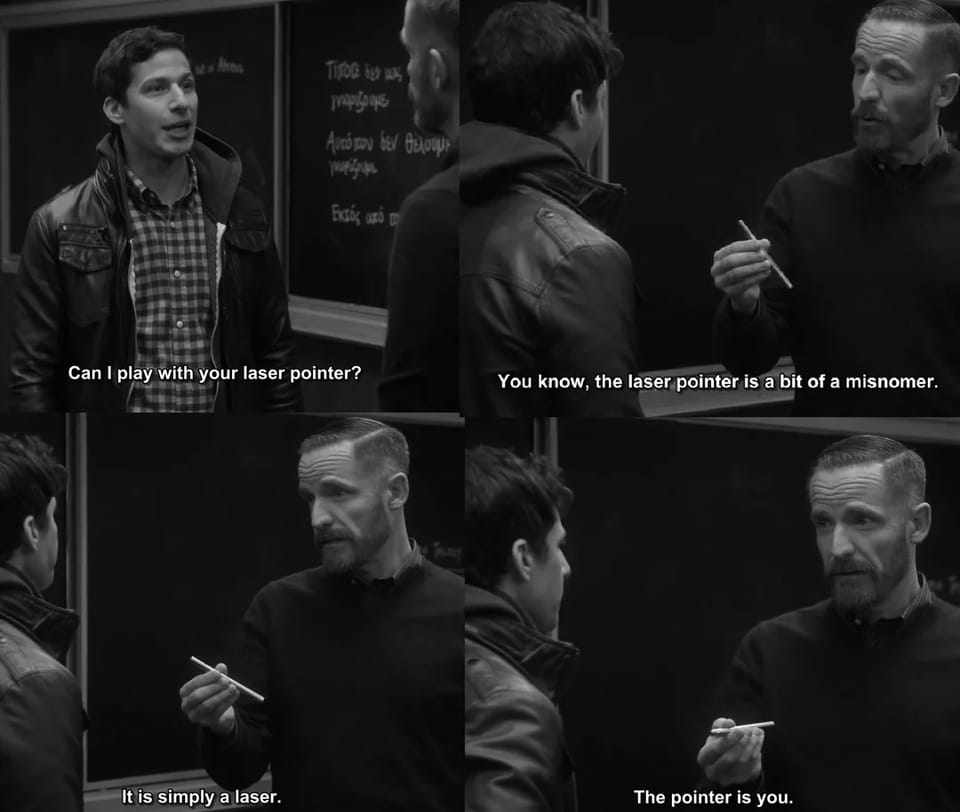Points of Emphasis for the First-Round Series with Orlando

The Orlando Magic won an incredibly ugly game against the Atlanta Hawks last night to secure the seven seed and the right to play the two seed Celtics in the first round. It wasn't a big surprise. The Hawks just don't play defense, and without Jalen Johnson and Clint Capela have almost no size whatsoever. Also, if the Magic had stayed healthy throughout the season, there's a good chance they could have at least climbed to the six seed. Alas, the Magic like to play rough, and ended up with a bunch of injuries they might not have endured otherwise. Such is the double-edged sword of physicality.
As I was taking a closer look at them during the game last night, I thought I would point out a few things I think should be points of emphasis for the series. On paper, this is a lopsided battle. The Celtics and Magic had two of the best defenses in the regular season, but while the Celtics also had one of the best offenses, the Magic had one of the worst. The caveat is that the Magic are finally mostly healthy, and some of that "worst offense" talk is a little misleading. They did play a significant chunk of the season with only one of Paolo Banchero and Franz Wagner. However, there are some easy prescriptions for stopping their offense. Let's talk about it.
Keep Them Off the Free Throw Line
The biggest way the Magic get their offense going is by getting to the free throw line. Last night, Paolo Banchero got to the line eight times in the first quarter. He and Franz Wagner are young and strong, and seem to relish throwing their bodies around, which they do frequently when working in isolation. The Magic attempted 23.0 free throws per game, which was seventh-most in the NBA. More tellingly, they also ranked second in FT/FGA, which is the number of free throws they took per field goal attempt. Only the Lakers ranked higher, and they have two of the hardest guys in the NBA to officiate. Orlando doesn't, which should give you an idea of their strategy. So the Celtics have to defend without fouling. Luckily, the Celtics are very good at this, as their defense ranked first in the NBA in FT/FGA.
Pack the Paint
The inverse of the Magic trying to get to the line a lot is that they don't take a lot of threes, and they don't make a lot of the threes they do take. To give you a sense of things, the Celtics three-point attempt rate – the percentage of their field goal attempts that were three pointers – was .536, meaning 53.6% of their shots were threes. In second place was the Warriors at .469. The Magic were down at 18th place at .411, decently below the league average of .421. In gross numbers, their 35.3 threes attempted per game ranked 23rd, and their .318 three-point percentage ranked dead last – by a lot. The Wizards were in 29th place, at .335, and they spent the second half letting their rookies bomb away without conscience. The Magic were much worse than even that. They made just 11.2 threes per game this season, dead last. The C's ranked first with 17.8.
As I stated above, the Magic also like to drive in isolation, mainly because they just can not pass the ball with any type of efficiency. They ranked dead last in assists per game at 23.0, and did not have a single player average five assists per game. And their third-best player in terms of assists – Jalen Suggs – won't play in this series.
What does that mean? It means this is a double big series for sure. There should be two bigs on the floor at all times. It also means there may even be reason to play a liberal amount of zone in this series. Orlando tends to drive and kick until they can get an angle to the hoop. When you're playing zone, you're less susceptible to overreacting to that style of offense. Either way, the goal is clear – make Orlando pass the ball more than they want to, and shoot from distance more than they want to, because they don't want to do either thing.
Don't Underestimate Cole Anthony
Banchero and Wagner are methodical players who rarely go nuclear, they tend to stack up points over time. Cole Anthony is just the opposite. If the Magic have one microwave player capable of swinging a game with his energy, it's Anthony. Usually, the best way to handle Anthony when he gets hot is to encourage him to keep shooting, because eventually he will cool off. But it doesn't always happen. Last night when he checked in in the third quarter, it was a three-point game. Then Anthony hit consecutive shots before the end of the quarter, and really got to work in the fourth, hitting four of six shots and dishing out four assists, and the game got out of hand shortly thereafter. The assists are key. When Anthony is really feeling it, he starts zooming around, and then so does the ball, and that's when the Magic offense is at its most dangerous.
Don't Force Three's
A lot will be made in the media of the Magic's two wins over the Celtics at home this season, because the media needs to make this series seem as competitive as possible. The main takeaway from those two games should be "Jayson Tatum didn't play." In the one game he did play against them in Boston, the C's blew their doors off. But while the Celtics offense just functions better when Tatum plays, there is another takeaway for the C's offense from those two games, and it's "don't force three's."
The Magic do a very good of running teams off the three-point line. Opponents shot an NBA-low 31.4 threes against them this season. Second-lowest was Houston at 34.5. This gap is by far the biggest gap between any two teams. We saw this first-hand in the two games in Orlando. In the first game in which we had everyone but Tatum in the lineup, we shot 8-for-33, and lost to an undermanned Orlando team. In that game, Jaylen Brown went 1-for-7, Kristaps Porzingis went 0-for-4, and Al Horford and Payton Pritchard each went 1-for-5. The bright spots were Derrick White (3-for-7) and Jrue Holiday (2-for-5), and it's not like they lit the world on fire. Sam Hauser, who shouldn't have played in that game because his back was still hurt at the time, took zero shots in 16:27 of action. I would have to check, but I'd wager that's the longest he's played in an NBA game without getting off a three.
In that game, and again in the second game a week ago where the starters and Horford sat, the C's missed a lot of those three's because they were forcing them. They have to make a more concerted effort to get into the paint and make plays there. For Orlando to combat this, they'll need to go away from what has been working for them recently – namely not playing Goga Bitadze as much.
For the season, Bitadze started 42 gams and played in 70, averaging 20.4 minutes per game. But in the first half, he averaged 23.6 minutes per game, and in the second half, he averaged just 14.7. He averaged a season-low 13.2 in March, and he didn't check in in last night's play-in game until garbage time in the final 3:52. They don't want to play him. Unfortunately, that leaves them with Wendell Carter Jr. at center, who is undersized for the position at just 6'10". He's basically Tatum's height. So Porzingis, Luke Kornet, and even Neemias Queta will all have size advantages over him. The C's need to exploit that in order to get the Magic to swarm into the paint and open up breathing room for their shooters.
Take Care of the Ball
As mentioned, the Magic are very physical on defense. TNT play-by-play guy Brian Anderson asked analyst (and former Magic coach) Stan Van Gundy on the broadcast last night if the Magic subscribe to the Jerry Sloan theory of "You Can't Call Them All," with "them" being fouls, and Van Gundy readily and heartily agreed. It should seem obvious that you can't win it all – "all" being a championship – with that strategy, as the Utah Jazz never won it all under Sloan, but that doesn't stop some teams from trying.
Orlando tied with Atlanta to rank second in total Stocks (steals plus blocks) this season. Individually, they ranked first in blocks and sixth in steals. In the two games the C's lost to Orlando, the Magic forced 19 and 16 turnovers. In the game Boston won, they only turned it over 10 times. So the old cliché is definitely true in this series. It shouldn't be as hard with Tatum at the helm, because he has been in control all season, but this will be key in the non-Tatum minutes, especially when Jaylen Brown is bringing the ball up. In that first matchup, Brown had five turnovers.
Stay Healthy
Ultimately, it's going to be a physical series, but one the Celtics will win. The key is to stay healthy. I can't find the clip, but there was one game last season where Paolo Banchero absolutely trucked Derrick White on a screen. I still think about it, because I was surprised White got back up. Orlando will try to do this stuff all series. That doesn't mean the Celtics should shy away from contact. On the contrary, the best way to get calls against this Magic team will likely be to finish through contact, because Orlando will happily foul you if you do – their 20.1 personal fouls per game ranked fifth in the NBA (the C's were 29th at 15.9). But it does mean that the C's have to do a good job of not being baited into the type of physicality that gets you offensive or technical fouls, and more importantly, can get you hurt. The next team on the docket – whether it's the Knicks or Pistons – will be just as physical.
